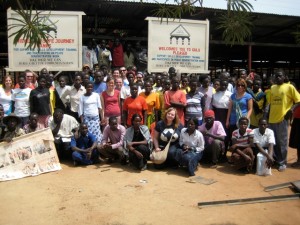Today we are excited to participate in Blog Action Day, an annual event when bloggers from around the world gather to write and discuss one topic. This year’s topic is “Human Rights.”
Global Exchange Reality Tours has a vision that meaningful, socially responsible travel, can and does, change the world. By offering experiential educational tours, Reality Tours has connected people to issues, issues to movements, and movements to social change. Many of the highlights of our Reality Tours include meetings with local human rights activists who work tirelessly to support their communities.
Below, hear from our in-country coordinator in Uganda Brian Ourien about some of the most pressing human rights issues that face Ugandans today.
—-
Human Rights in Uganda
The Ugandan constitution provides for the protection of every Ugandan’s human rights, with emphasis on providing an enabling environment for all to flourish. The greatest challenge, though, is the poor implementation of these laws, leaving huge gaps that allow abusers to take advantage of vulnerable people, mostly women and children.
Domestic servitude is the most common form of human trafficking. Many children are brought into the city and other urban areas by relatives and friends of relatives with the promise of a better life. Many of these children end up working as domestic servants in the homes of their urban relatives, and are sometimes sold off to work for people who are not even remotely related to them. This means that their dreams of getting a better education and a better life in the city are replaced by despair and some of the most decrepit living conditions.
Sex trafficking is a growing form of injustice in Uganda’s cities and towns. Despite its being illegal, prostitution seems to be growing. There is also a growing number of underage girls (some as young as 10 years old) being roped into illegal brothels, mostly set in the slum areas of the capital Kampala.
Child Soldiery in Uganda
With more than twenty years of conflict in Northern Uganda, children became the prime target for rebel groups, abducting and conscripting them into rebel ranks. The children were trained into mindless soldiers who executed terror with little or no mercy and remorse.
Over the years these children have trickled back into the country – having escaped with the most harrowing tales imaginable, while others were rescued by the Ugandan army and brought back home to eagerly-waiting families. Soon enough the difficult process of reintegration begins.
Often shunned by relatives, some of whom suffered at the hands of the child rebels, the returning children struggle to find identity and acceptance in the communities they once called home. Some of the children spent more than ten years in the jungles of Sudan, Congo and Central African Republic and now return to a ‘normalcy’ they have never experienced. Their violent approach to life and their short tempers find no place in a community already burdened by years of violent abuse at the hands of ruthless rebels.
Fueled by conflict over land long uninhabited and whose boundaries have been washed away by years of abandonment – whose previous owners found their only refuge in displaced people’s camps for more than twenty years, northern Uganda grapples with post-conflict issues.
From unclear farming boundaries and contested homelands to emotional trauma and economic strife, northern Uganda seeks to break free of the past and to build a future in which children will once again be free to grow in a world bursting with possibility and the promise of a bright future.
Brian also shares with us how travel to Uganda can expand Westerners perspectives:
 Reality Tours is a great opportunity for participants to get immersed in the work of organizations fighting to secure the rights of vulnerable people in Uganda. Reality Tours participants get to hear, first hand, the stories of those who have faced grave injustice and whose life paths have been unfairly changed by selfish people.
Reality Tours is a great opportunity for participants to get immersed in the work of organizations fighting to secure the rights of vulnerable people in Uganda. Reality Tours participants get to hear, first hand, the stories of those who have faced grave injustice and whose life paths have been unfairly changed by selfish people.
Above all, the most memorable and important moments is the connection that grows between the participants and the people in the host organizations. There is always a heart-warming sense of family and unity when travelers visit the many organizations with rescued victims of violent oppression.
Thanks so much to Brian for taking the time to share his thoughts with us!
- Learn more about human trafficking in Uganda and other countries; Read about the socio-political situation in Uganda and Learn about child soldiers;
- See what Reality Tours trips to Uganda we have coming up!
